
When Homeschooling Fails Should the Government Step In? (Ep. 21)
According to a recent Washington Post article, homeschooling is the fastest growing form of education in America. As many as 2.7 million students are currently being homeschooled. One of my guests, Heidi Sampson, is a veteran homeschooling parent from Maine and a four-term Republican legislator. She concedes that homeschooling is not for everyone but says, “The overwhelming evidence nationally for homeschooling is the fact that there's an opportunity for students to excel.”
Another guest, Nicole Doyle, a leader of the Georgia Black Home Educators Network in Georgia, says homeschooling is a form of “resistance” to people who blame Black parents for their children's poor educational performance. Homeschooling is also a way for Black families to ensure their children receive a culturally relevant education, she says.
What makes homeschooling controversial is that fact that the U.S. regulates it less than any other industrialized nation. In many states, homeschooling parents can simply educate as they wish with their children. They are not required to follow a curriculum or to administer academic assessments. As such, they are not accountable for what their children learn.
This is how it should be, parent rights advocates argue, but some, like Weston Brown who was homeschooled in Texas, has a different perspective. “I absolutely believe that there should be regulation, that there should be oversight...I grew up hearing the phrase ‘the rights of the parents’ over and over and over again, and it wasn't until I was in my early twenties that, for the first time, I heard, ‘What about the rights of the child to a basic education?’” Weston believes his parent’s intentions were good, but he expressed deep concern about the education they provided. “I learned things like the enslavement of millions of people was necessary for America's growth. I didn't know about of any of the key leaders of the civil rights movement.”
Samantha Field also expressed regret about her homeschooling experience. “My parents didn't know how to teach me any form of basic math beyond basic arithmetic. And once I reached algebra in high school, I was forced to try to teach myself. I was unsuccessful but attributed my inability to do that to being a woman, as I had been taught that women were innately incapable of understanding higher math.”
Heidi, the lawmaker from Maine, empathizes with Weston and Samantha, calling their stories “heart wrenching." She says there should be a way to “mitigate” homeschooling experiences like theirs, but cautions against government overreach. “The more you regulate, the more you're going to have issues and problems,” she says.
What inspired me most about this conversation is that my guests - each with vastly different experiences and perspectives - listened, empathized, and were eager to learn more from one another.
At the end of this conversation, Heidi said, “I have a lot of thoughts, a lot of takeaways…I could sit down with each one of you and just listen and just explore ideas…I think I have a pretty good feel of what's going on here in Maine, but to hear the different cultures is exciting…How do we best serve all these different cultures in the United States to homeschool their children to the best of their ability and give those children every opportunity to shoot for the stars?” Weston said, “I love having this conversation…and it could go on for hours.”
To set the stage for this civil exchange I started the conversation by asking each guest to describe a teacher who had a positive impact on their life. I didn’t include their responses in the episode, but starting with personal stories, as I do in most of these episodes, always




















